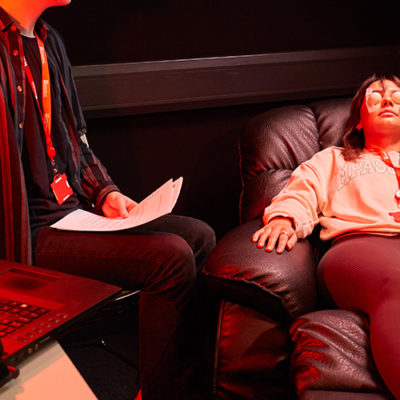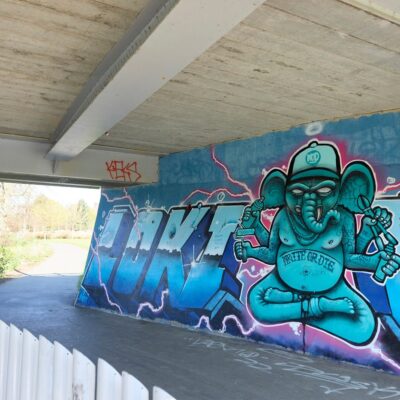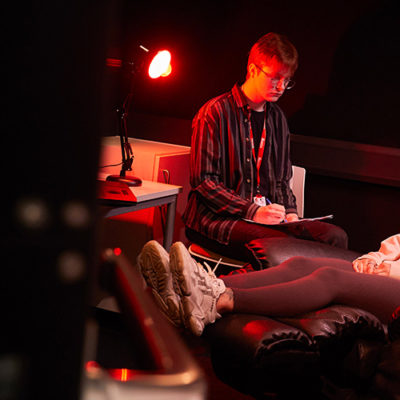
Federico Farini
Professor of Sociology
Faculty of Health, Education and Society
DiscoverGet in touch with us as we may be able to offer you a place for September 2024 through Clearing.
UCAS Code
3 year: L300
Foundation: L301
Level
UndergraduateUG
BA (Hons)Duration
3 years full-time
4-6 years part-time
4 years full time (Integrated Foundation Year)
Starting
September
BCC at A Level
DMM at BTEC
Fees UK 24/25
Full Time: £9,250
Part Time: £1,540 per 20 credit module
Integrated Foundation Year: £9,250
Fees International 24/25
Full Time: £15,200
Integrated Foundation Year: £15,200
Location
For questions regarding study and admissions please contact us:
study@northampton.ac.uk
0300 303 2772
We live in unprecedented eventful times of intense, rapid and constant social transformation – from rising economic inequality/poverty, the climate crises, threats to liberal democracy, the impact of social media, the recognition of LGTBQ+, BLM and disability groups, to name just a few – creating an increasingly complex world of both progress and peril that sociologists are best equipped to address. So, if you are excited by contemporary questions and convincing explanations about the world around you, then studying a BA Sociology degree is for you.
The University of Northampton’s Sociology team has the necessary high quality teaching and research experience to provide you with the sociological knowledge, skill and confidence to succeed in higher education. You will have the opportunity to study a diverse range of interdisciplinary topics, from identity/self, inequality/injustice, education, media/culture, crime/deviance, love/body, work/volunteering, health/wellbeing, utopianism/future, environment, and death – and actively engage with these pressing real-world contemporary issues head on. Teaching is made up of active blended learning in and around the classroom via small group work with a diverse student body and individualised assessment types, and through research/reflection out in the field on placements and our highly subsidised international field trip. On the BA Sociology degree, you will acquire employability skills required to achieve not only personal graduate success in in a wide range of career pathways in the public, private or third sectors, but also positive social change to benefit the public good, tailoring your ‘sociological imagination’ to something that you are interested in and care about.
Updated 18/07/2024
This sociology university course has been designed to contribute towards achieving the following United Nations Sustainable Development Goals: SDG5 Gender Equality; SDG10 Reduce Inequalities and SDG11 Sustainable Cities and Communities.
You will join a thriving university in general and a sociology specific learning community of academic and professional service staff, as well as a diverse range of students in a thriving interdisciplinary environment. The BA Sociology team are extremely passionate about sociology and the important role it functions for the world, on macro, meso and micro levels; we are highly motivated to inspire future generations who seek to make a difference to the world around them.
While studying the degree in sociology, you will apply your sociological imagination to learn new ways of critically understanding and discussing important contemporary questions/concerns from a many different social science perspectives and approaches, not just through the dominant Western – such as: How do humans shape and are shaped by the societies they live in? How do we shape our own identities? How does our physical environment influence our lives and societies? How are social inequalities represented in our culture and media? How can we understand race, ethnicity and migration after Brexit? How have ideas of love and intimacy changed throughout history? How do different ideas of the future influence our lives?
The Sociology degree programme is delivered in a semesterised format. In stage one, important core ideas, evidence and methods are introduced. This basic knowledge is built upon in stages two and three to foster an advanced understanding of increasingly specialised topics and allowing you to increasingly focus on individual areas of specific interest. For all three stages/years you will receive 12 hours per week of dedicated teaching support over two semesters (for the most part divided into three modules per semester, with three hours face-to-face and one hour online for each module), as well as additional staff, personal academic tutor and professional service support and guidance – although for your second and third years you will receive incrementally less compulsory class teaching time and more optional one-to-one support in your second semester when completing your research/reflection project and dissertation.
The BA Sociology degree programme can be taken as a full time or part time. If you are studying this course full-time, you will take 120 credits worth of modules for each stage for three years – totalling 360 credits overall. All modules are 20 credits (with the exception of the 40 credit dissertation module). Some modules are compulsory, whilst others are designated – so selected from a range of options.
In your first year, core compulsory modules connect with previous teaching/learning to provide you with a foundation of knowledge and understanding in the discipline of Sociology, ensuring that you get to grips with key sociological issues, theories and concepts (even if you have never studied sociology before), to more than sufficiently prepare you for your future as a budding sociologist.
In the second year, you will have the chance to develop your knowledge further in various old/new areas of contemporary sociological and societal significance – with an increasing focus on individualised assessment topics where possible. One of the areas we focus on is the theory and practice of social research methods, with an opportunity to apply your social research and reflection skills, in a variety of settings in the field, focused on a topic of sociological and societal interest to you.
In your final year, you will have the opportunity to explore more complex sociological theories and concepts, in various old/new areas of contemporary and future sociological and societal significance – with even more of focus on individualised assessment topics where possible. In addition, you will also have the chance to research and investigate an important sociological and societal topic of your choice in greater detail, and expert dissertation supervisors (who you meet regularly) support you in the process.
Please note the modules shown here relate to the academic year 24/25. The modules relating to the academic year 25/26 will be available from June 2025.
In your first year, core compulsory modules connect with previous teaching/learning to provide you with a foundation of knowledge and understanding in the discipline of Sociology, ensuring that you get to grips with key sociological issues, theories and concepts (even if you have never studied sociology before), to more than sufficiently prepare you for your future as a budding sociologist.
In the second year, you will have the chance to develop your knowledge further in various old and new areas of contemporary sociological and societal significance – with an increasing focus on individualised assessment topics where possible. A primary focus is on the theory and practice of social research methods, with an opportunity to apply your social research and reflection skills, in a variety of settings in the field, focused on a topic of sociological and societal interest to you.
In your final year of the sociology degree, you will have the opportunity to explore more complex sociological theories and concepts, in various old/new areas of contemporary and future sociological and societal significance – with even more of focus on individualised assessment topics where possible. In addition, you will also have the chance to research and investigate an important sociological and societal topic of your choice in greater detail, and expert dissertation supervisors (who you meet regularly) support you in the process.
A typical offer to study BA Sociology at the University of Northampton would be:
We welcome applications from students with a mix of A levels and BTEC/Cambridge Technical qualifications.
We welcome international applicants and applications from those with a range of non-traditional educational or professional qualifications.
Admission to the Foundation Framework for the degree in sociology is normally:
We welcome applications from students with a mix of A levels and BTEC/Cambridge Technical qualifications.
however, we would also like to hear from you if you have professional or industry experience instead, a range of other qualifications or self-developed subject knowledge that relates to the course you wish to study.
All International and EU students applying for a course with us must meet the following minimum English language requirements:
For information regarding English language requirements at the University, please see our IELTS page.
Fees quoted relate to study sociology in the Academic Year 24/25 only. They may be subject to inflationary increases in future years.
Fees quoted relate to study sociology in the Academic Year 23/24 only. They may be subject to inflationary increases in future years.
The optional International Field Trip* is partially funded by the University. The cost of trip is on average between £600-£1,000 and students pay part of this cost.
As a part of the placement, students get a free DBS paid by the University (where required), but students need to pay for any additional expenses such as travel costs.
For information on the scholarships available to you, please see our scholarships page.
For more information about possible funding options, please visit our Fees and Funding pages.
At the University of Northampton, everything we do, from funded trips to paid internships, is to give you everything you need to make a difference when you leave.
If you join this full time sociology degree at the University of Northampton, you will receive a laptop when your course begins*. The laptops are built to a bespoke custom specification ideal for use in the seminar room, collaborative group work or studying at home.
Whatever your ambitions, we’re here to help you to achieve them. We’ll support you to identify the skills you’re learning during your sociology course, find your strengths and secure practical experience so that when it comes to applying for jobs or further study you’ll feel confident in standing out from the crowd. We’ve created the Northampton Employment Promise because we are so confident that if you focus on your studies and complete one of our awards you’ll be highly employable by the time you graduate. Putting you in a great position to secure employment or continue your studies.
To check out the full list of perks, visit our Student Perks page or dedicated International Perks page.
* UK fee payers only (see Terms and Conditions for further details)
The Integrated Foundation Year (IFY) offers a new and exciting route into studying for a degree in Sociology, attracting ambitious and driven students who are willing to learn and advance.
If you have non-standard qualifications or do not quite meet the admissions requirements for the degree in sociology, we can offer you a fantastic opportunity to study a four year programme which includes an Integrated Foundation Year. The Integrated Foundation Year will help you develop the theoretical/practical and academic skills you need, in order to successfully progress to the full award.
Our four-year courses will enable you to successfully follow the degree pathway of your choice while gaining essential study skills. The foundation year of your chosen degree will be studied on a full-time basis and is aimed at supporting the transition to higher education. Years two, three and four are then studied as a standard degree programme.
Our approach to teaching and learning on this sociology degree combines face-to-face teaching with carefully crafted digital experiences*, designed to help you take control of your own learning. Typically, you will study in small, interactive group sessions, where you learn through interactive, teamwork and problem-solving activities, and have a range of online resources and materials at your fingertips.
The assessments on the BA Sociology course are regularly praised by our external examiners as being imaginative and varied. Assessment methods used on this course include:
As sociologists, we value the significance of understanding different societies/cultures to our own, and for that reason, there is an exciting opportunity in the second year to participate in an international field trip, allowing you to learn about how different societies/cultures function, and apply your sociological knowledge and understanding to real-life in-the-field scenarios.
In the past, students have travelled to New York, Abu Dhabi, Berlin, Athens, Rome, a ‘Brexit Tour of Europe’, and Istanbul. Each year we work together to decide on a unique destination, dependent on interest, opportunity, distance, risk and cost.
The field trip is optional. For a five-to-seven-day visit, the cost of the trip will be no more than £1,000 (that includes flights, hotel – usually bed and breakfast – and airport transfers), for which you will be asked to contribute a small amount (usually around £150 + additional spending money for extra costs).
Professor of Sociology
Faculty of Health, Education and Society
DiscoverSenior Lecturer in Sociology
Faculty of Health, Education and Society
DiscoverSenior Lecturer in Sociology
Faculty of Health, Education and Society
DiscoverSenior Lecturer in Sociology
Sociology BA (Hons)
DiscoverSenior Lecturer in Sociology
Faculty of Health, Education and Society
DiscoverSenior Lecturer in Sociology
Sociology BA (Hons)
DiscoverThe University of Northampton places an important emphasis on supporting you in achieving your graduate career and/or postgraduate study ambitions, by providing lots of opportunities to experience the world of work.
Employability skills are built into the Sociology degree programme throughout the three years, so that you are consistently building the skills that you will need to prepare for the world of work.
As well as the placement opportunity in your second year, you have the opportunity to complete an optional year-long work placement in between Stages 2 and 3 of study. If you choose to take a placement year, you will spend a whole year (up to 48 weeks) working in an area/organisation of interest to you, in the UK or overseas. The Student Futures team offer a lot of support in helping you to find a placement. This invaluable experience helps you to apply your learning in your final year (including your dissertation) and prepares you for your future graduate career.
What can you do with a sociology degree?
Our BA Sociology degree students have ended up with careers in fields ranging from education, youth work, charities and community organisations, to PR and marketing, media and journalism, HR and management, as well as social work, politics, and social research – to name just a few. The advantage of doing a sociology degree is that it prepares you for many different graduate careers, in an increasingly uncertain world.
“The opportunities for personal growth, offered by both the University and the Sociology department, are one of the best things about studying here.” “My placement enabled me to enhance my communication and presentation skills, including how to keep things both fun and educational for a diverse group of children with different backgrounds and learning abilities.” - Zoe Clair -

The Psychology course is embedded within a highly flexible modular system, enabling you to choose modules from a range of options.

Studying Criminology with us gives you a distinctive approach to learning, drawing on the disciplines of sociology, psychology, history and law.

This course provides you with an excellent grounding for careers across the public, private and voluntary sectors.

If you want to become a counsellor, counselling psychologist or develop transferable counselling skills, this course is one of only a few that is designed specifically for you